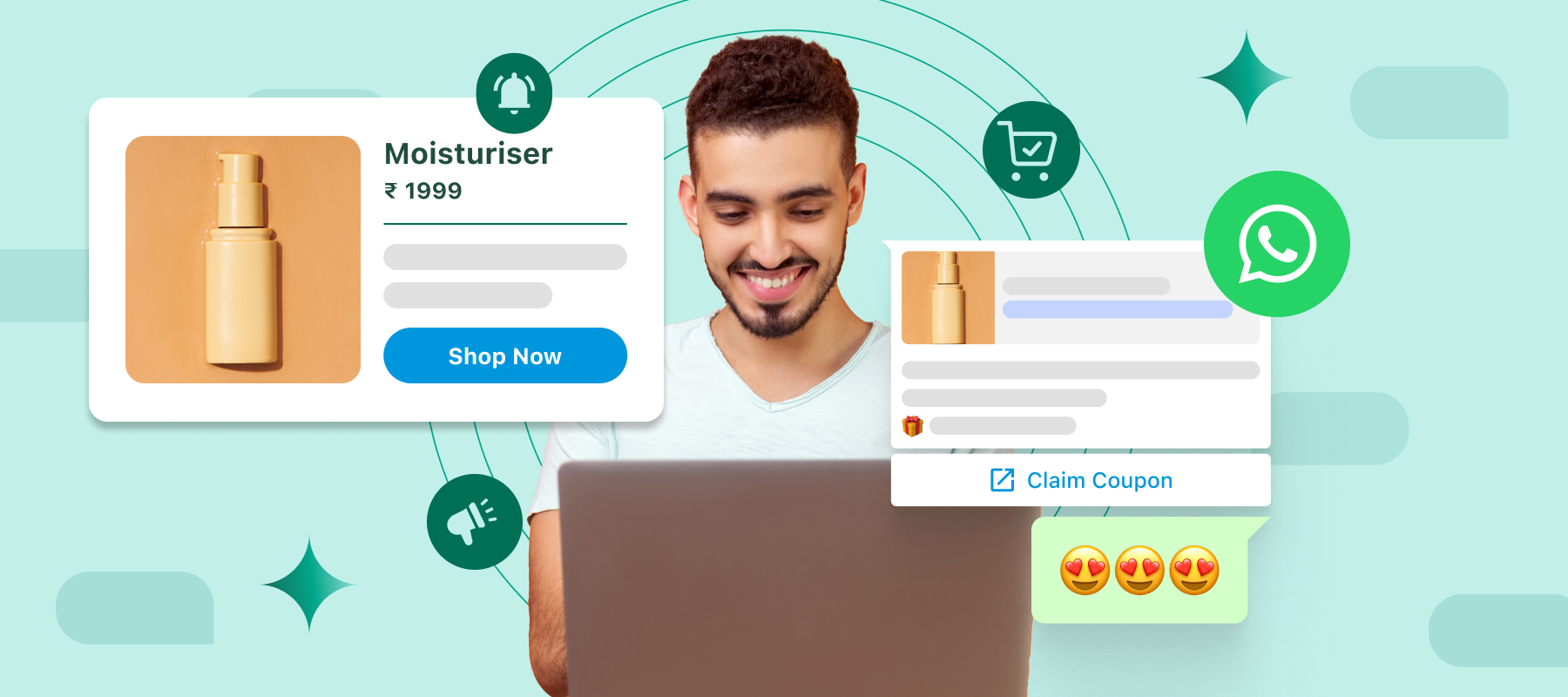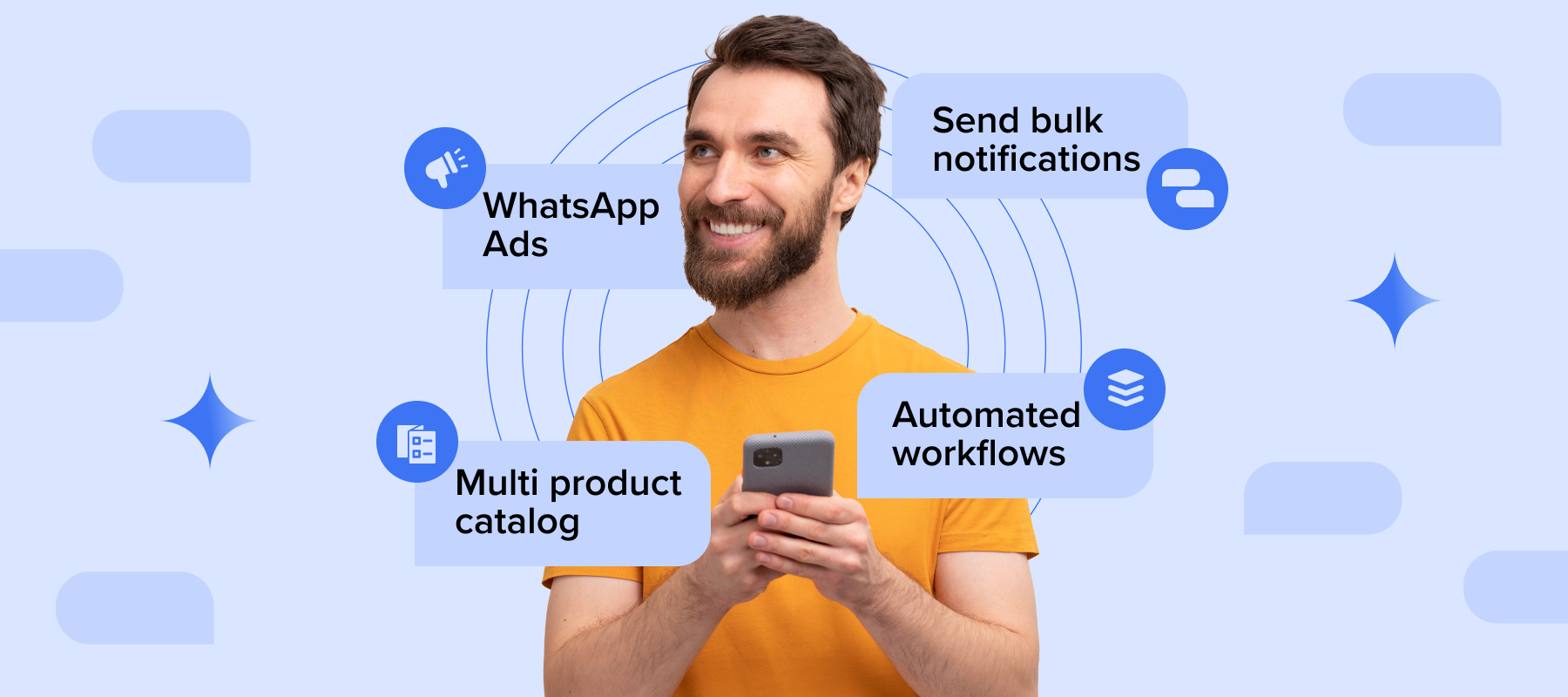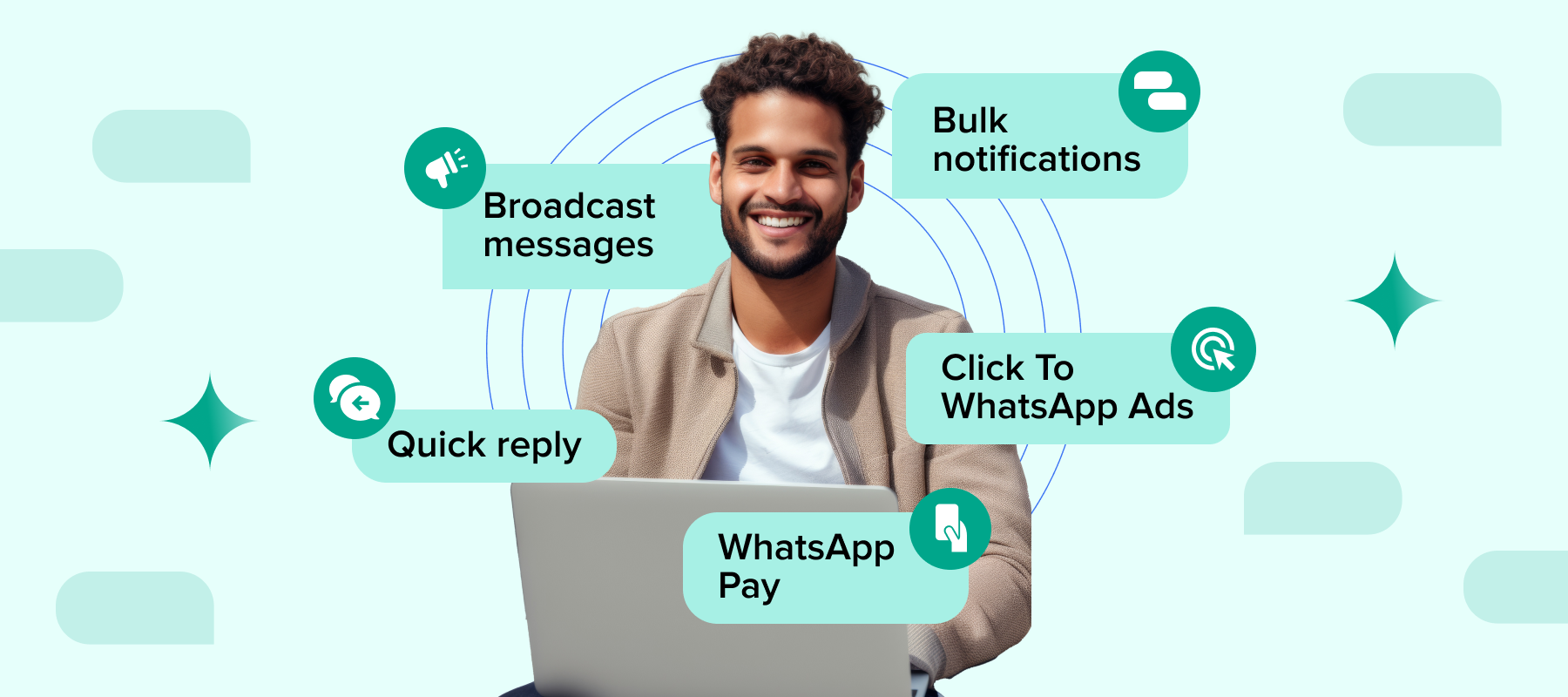Businesses need to be where their customers are. With a monthly active user count of over 2 billion, WhatsApp is a leading customer engagement channel for eCommerce industry businesses to drive the entire customer journey from pre-purchase to post-purchase. In this article, we’ll explore how businesses can boost their WhatsApp e-commerce strategy, maximize ROI from their WhatsApp marketing campaigns, and achieve higher customer satisfaction with personalized customer service on WhatsApp. Let’s dive in.
WhatsApp's Popularity [2025]
With high engagement rates and widespread use across demographics, WhatsApp facilitates one-to-one, two-way messaging for businesses. Just come to think of it: 175 million people message WhatsApp Business accounts daily, while WhatsApp messages have a 98% open rate. WhatsApp for business has diverse integration capabilities, including API access for enterprise-level automation, multi-agent support for customer service teams, CRM system integration, and analytics and reporting features, among others.
WhatsApp For E-Commerce Brands
Direct sales channel: E-commerce businesses are unlocking higher sales through WhatsApp catalogs, creating dynamic storefronts. Businesses can showcase their entire product range with images, videos, and detailed specifications, while enabling customers to ask questions, receive personalized recommendations, and complete purchases – all within the chat interface. The provision to collect payments on WhatsApp further reduces friction in the buying journey. Businesses can also recover abandoned carts, send back-in-stock alerts, and provide upsell and cross-sell for increased average order value (AOV) and buyer satisfaction.
Efficient customer service: WhatsApp allows businesses to automate customer service for routine queries such as order updates, shipping notifications, and delivery tracking. Returns management, too, is more streamlined as customers can initiate requests, track status, and receive guidance through familiar chat interfaces. A WhatsApp chatbot drives 24/7 support for product queries and post-purchase engagement, enhancing the customer experience.
Personalized marketing for deeper engagement: WhatsApp enables e-commerce businesses to implement marketing strategies with segmented broadcasts and tailored promotions. Limited-time offers and exclusive deals for WhatsApp subscribers create a sense of privilege, while early access to product launches and special event previews reward loyal customers.
Benefits of Using WhatsApp for E-commerce
Global reach: Businesses on WhatsApp can reach a global audience. The platform’s widespread adoption, particularly in emerging markets, opens new opportunities for businesses to expand their reach without additional marketing investment, making it an invaluable channel for international market penetration.
Messaging efficiency: WhatsApp enables businesses to respond to customer inquiries in real-time, reducing the gap between interest and purchase. This immediacy not only enhances customer satisfaction but also improves conversion rates, as businesses can address concerns and provide product information right when customers are most engaged in their buying journey.
Rich media: WhatsApp enables rich media sharing to showcase WhatsApp product catalogs, provide interactive demos, and create visually engaging customer experiences. This feature allows brands to share high-quality images, videos, and PDFs directly within the chat, helping customers make informed purchase decisions. By embedding interactive elements like buttons or carousels, businesses can guide customers through a dynamic and user-friendly shopping journey, enhancing engagement and simplifying the purchasing process.
Key Strategies for E-commerce Businesses
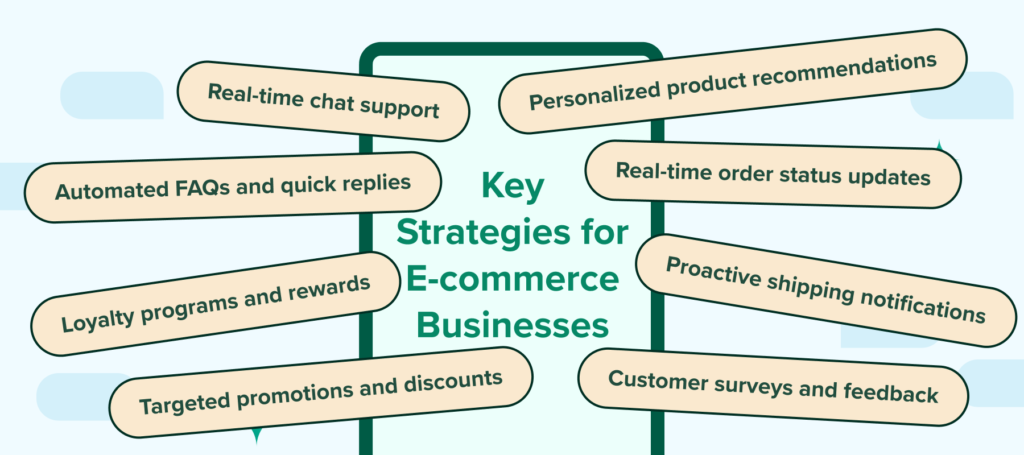
As e-commerce continues to evolve, businesses are facing a critical challenge: how to deliver personalized, efficient service at scale without losing the human touch. Forward-thinking companies are finding the answer in WhatsApp’s business tools, implementing strategic approaches that boost both operational efficiency and customer satisfaction.
Customer Support and Inquiries:
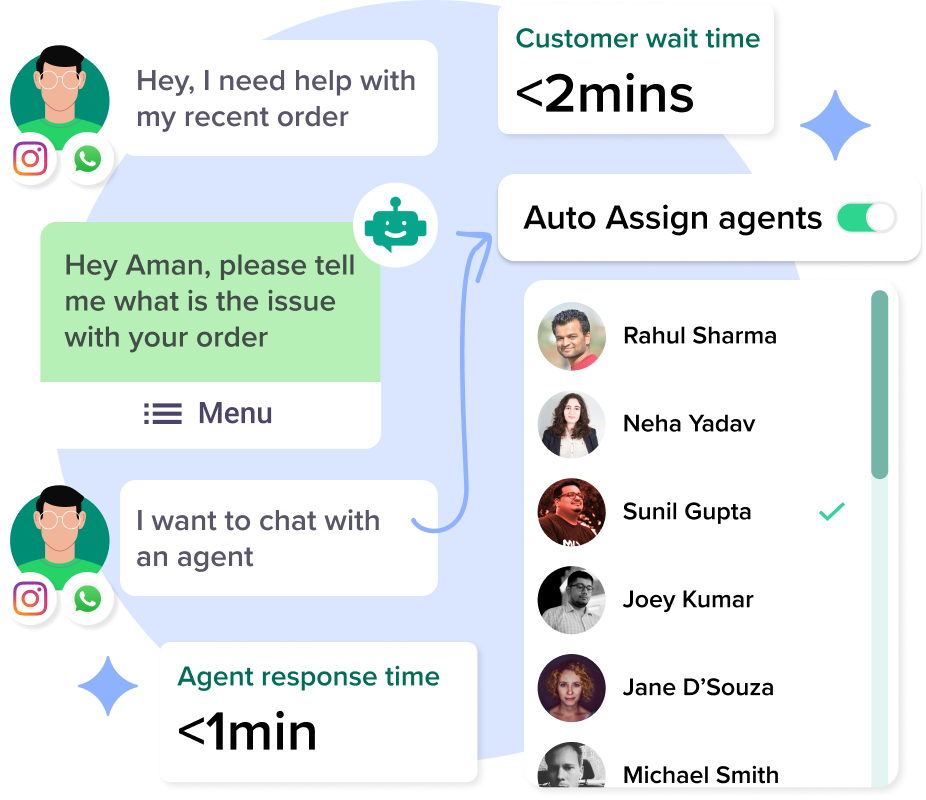
Real-time chat support: Real-time support through AI and human agents can make the support process more efficient, resulting in higher customer satisfaction and positive brand impression. For example, configure automated responses for common questions about sizing, availability, and shipping policies, while routing complex inquiries to live agents. Set up quick replies for frequently asked questions like “What’s my order status?” or “How do I return an item?” with templated responses that can be personalized before sending.
Automated FAQs and quick replies: With WhatsApp’s quick-reply feature, businesses can create and save automated responses that can be sent out to users who reach out with FAQs and routine queries. E-commerce businesses can set up quick replies for commonly asked questions like “What is your return policy?” or “Where’s my order?” This way, when customers inquire about these topics, they receive an instant, consistent response – freeing up time for agents to address complex queries and improving response times for customers.
Personalized Marketing:
Targeted promotions and discounts: Businesses can tailor offers to individual customer preferences and behavior. By using purchase history and browsing patterns, companies can send personalized discount codes, exclusive offers, or relevant product updates directly to customers. For instance, a clothing retailer might send a “10% off” coupon on recently viewed items or alert customers to upcoming sales on favorite brands. This approach not only increases engagement but also drives higher conversion rates, as customers receive promotions aligned with their specific interests.
Personalized product recommendations: Businesses can offer customers highly relevant suggestions based on their browsing history, preferences, or past purchases. For instance, a cosmetics store could suggest complementary skincare items to someone who recently bought a moisturizer, or a fitness brand might recommend workout gear to a customer interested in sportswear. These tailored recommendations enhance the shopping experience by helping customers discover products they’re likely to enjoy, increasing engagement and driving more personalized, meaningful interactions.
Order Updates and Tracking:
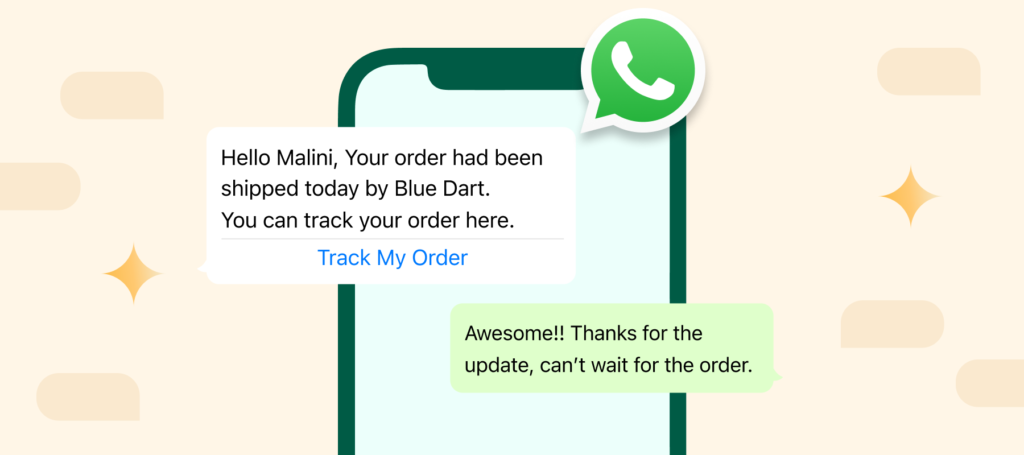
Real-time order status updates: WhatsApp enables businesses to keep customers in the loop with real-time updates on their order status. Whether an order is confirmed, in transit, or out for delivery, instant notifications provide peace of mind and enhance customer satisfaction.
Proactive shipping notifications: Proactive shipping updates on WhatsApp keep customers informed every step of the way. With timely alerts, such as when a package is dispatched or expected to arrive, businesses can reduce inbound queries and foster a seamless, transparent customer experience management.
Post-Purchase Engagement:
Customer surveys and feedback: WhatsApp offers a direct way to gather valuable customer insights. By sending short surveys post-purchase or asking for feedback on recent interactions, businesses can understand customer satisfaction, pinpoint improvement areas, and gauge product reception. This feedback loop supports ongoing improvements and fosters customer-centric growth.
Loyalty programs and rewards: Through WhatsApp, businesses can create and promote loyalty programs, sharing exclusive rewards or discount codes with loyal customers. Regular updates on earned points, rewards eligibility, and special offers help nurture long-term relationships and incentivize repeat purchases.
Best Practices for Effective WhatsApp E-commerce
Quick Response Times:
Importance of timely responses: Responding quickly on WhatsApp is crucial for keeping customers engaged. Quick responses help build trust, reduce cart abandonment, and drive faster purchasing decisions, ultimately enhancing the overall customer experience.
Strategies for efficient customer support: To streamline support, businesses can use WhatsApp’s automation features, such as quick replies for FAQs, chatbot integrations for round-the-clock assistance, and CRM tools to prioritize inquiries. These strategies ensure customers receive prompt, accurate support without overwhelming the support team.
Consistent Branding:
Maintaining brand identity on WhatsApp: Consistency in brand identity reinforces familiarity and trust. Adding brand colors, logos, and familiar visuals to WhatsApp messages also helps uphold brand recognition. In addition, by using the same tone, language, and style that customers expect from other channels, businesses can create a seamless experience.
Designing engaging messages: Crafting engaging messages on WhatsApp involves using concise, relevant text paired with interactive elements like buttons and media. This keeps conversations dynamic, appealing, and aligned with customer expectations for instant and interactive communication.
Data Privacy and Security:
Protecting customer data: Securing customer data on WhatsApp involves implementing end-to-end encryption, data encryption during storage, and secure access protocols. By leveraging WhatsApp’s built-in security features and using an approved API provider like Interakt, businesses can protect sensitive customer information from unauthorized access.
Adhering to data privacy regulations: Businesses must comply with regional data privacy laws, such as GDPR, HIPAA or CCPA, when using WhatsApp for e-commerce. This includes obtaining customer consent for data use, providing transparency on data handling, and allowing customers to control their personal data, helping build trust and maintain compliance.
Conclusion
WhatsApp is reshaping customer engagement in eCommerce, offering businesses a powerful, personalized channel to enhance interactions, drive conversions, and foster loyalty. As consumer expectations evolve towards faster, more tailored communication, adopting WhatsApp’s tools ensures businesses can stay competitive. The future lies in creating seamless, AI-driven experiences that not only solve problems but anticipate customer needs. By leveraging WhatsApp, eCommerce businesses can transform how they connect with customers, ensuring every message counts in building stronger, more lasting relationships.
